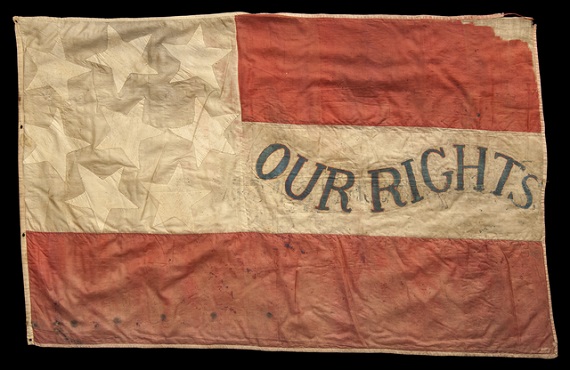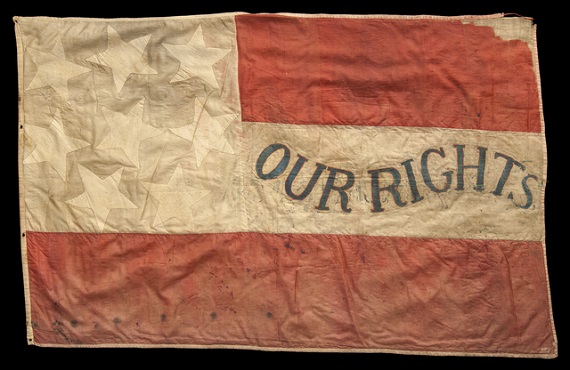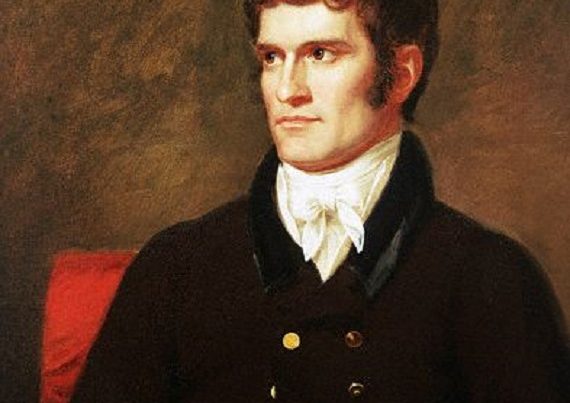First some context. The South did not secede to “preserve and extend slavery.” Its “pro-slavery“ arguments were not in response to any major political party in the antebellum period calling for emancipation. There was none! Southern secession was a result of 70 years of defending itself against Northern economic exploitation, Northern unwillingness to abide by Constitutional mandates and restraints, and a more recent Northern inclination to centralize sovereignty in the general government. Slavery issues were only the latest “occasions” regarding Northern Constitutional infidelity. Therefore slavery issues were a derivative of a more fundamental concern over the North’s history of disregard for the Constitution in its quest for political and economic control of the US.
In violation of the Constitutional mandate to “preserve the domestic tranquility,” Northern States did nothing to quell the abolitionist agitators in its States. And Northern politicians used the slavery issue to play upon the racist fears of Northerners in order to coalesce them into a unified sectionalism arrayed against the South for the purpose of political control by which to continue economic exploitation. This effort included violations of the Constitutional mandate to return fugitive slaves and of the Constitutional requirement that the States have equal enjoyment of the commonly owned territories. Therefore the South seceded to gain independence from an unfaithful section of the Union, and not from any desire to preserve slavery! Concerns regarding slavery were the most frequent topic because they represented the most recent and legally egregious violations of the Constitution prior to secession.
Therefore, Southern “pro-slavery” arguments were in response to two provocations. One was the irresponsible demands of a small but influential group of Northern abolitionists calling for immediate, uncompensated emancipation that included terrorist activity. The North, which ended slavery because its climate made the institution unprofitable, had allowed itself 25 years to emancipate its much smaller population of slaves without any economic or social sacrifice. Most sold their slaves South. Yet Northern radicals did not want to extend the same courtesy to the South which had no place to disperse a much larger population of landless, penniless, and mostly uneducated people.
Second were Northern politicians, who opposed any blacks migrating North or West and therefore were unwilling to consider a national plan of integration that could have provided a humanitarian means of Southern emancipation. They sought to keep all the slaves bottled up within Southern borders on an “ipso facto” black reservation until a time in which they could either all be colonized out of the country, or be cut off from the welfare of the master to “die out” unable to compete with whites in America. This “anti-slavery” had an anti-black racist motive, and a political motive to end the “slave power” (a euphemism for the political clout the 3/5ths rule and cotton revenue provided the South). The North, if it was to maintain a pro-North advantage in the Senate, could not allow that clout to expand into the territories and form new pro-South States.
It was in this historical context that Southerners defended slavery as a “positive good” given it was the best means of doing the most good and the least harm in terms of managing so large a population of destitute people. There was no good way the South could economically and humanely absorb that many people suddenly freed within Southern borders alone without a disaster. Southern sensibilities were repulsed by Northern ideas of “colonization,” or causing the black folk they had grown up with in the integrated South to die out! Southerners saw slavery as a positive good not only because it Christianized and civilized what, in the 19th century mind, was a barbarous people, but because it was a means of harboring these destitute people from the anti-black schemes of Northerners. It was analogous to how Oscar Shindler of WWII fame used slavery in his munitions factories to protect Jews from Nazi death camps. This is why the writer of the Mississippi Declaration of Secession laments that North “seeks not to elevate or to support the slave, but to destroy his present condition without providing a better.” Southern “pro-slavery” had within it a genuine humanitarian concern for the slave. Something that was woefully lacking in most all Northern “anti-slavery motives.
Southern “pro-slavery” arguments, including those made in the Declarations of Secession, should not be confused with their motive for secession. The old adage is “actions speak louder than words.” At least in the case of the South, its actions clarify its words about slavery. There is abundant proof in the actions of the CSA after secession that slavery was NOT the motive for secession. The CSA turned down the infamous Corwin Amendment. It turned down the offer to keep slavery made in the Emancipation Proclamation. It turned down the suggestion at the Hamptons Road Peace Conference that by returning to the Union it could defeat the proposed 13th Amendment ending slavery. In addition to these actions, throughout the war, various Southern leaders and newsprint stated explicitly that slavery was not “the cause” for which they seceded and fought. Both in actions and words the South made clear that “preserving and extending” slavery was not its cause. Its cause, its ultimate object was INDEPENDENCE.
Perhaps the strongest post-secession ACTION proving slavery was not the CSA secession motive was its willingness to end slavery to achieve its ultimate object of independence. Regarding this willingness we find evidence in both foreign and domestic sources beginning as early as 1861.
As difficult as emancipation was going to be, the South was so determined to gain independence that it was willing to do it even at the high economic and social cost of freeing the slaves and trying to accommodate them within the CS borders alone. The South knew it would need foreign support to win its war for independence. It also knew that a barrier to that support was the institution of slavery. So as early as November of 1861, there is primary source evidence that the South was willing to endure the immense difficulties of emancipation if it meant obtaining recognition and military support from France and Britain.
A British paper called “Once A Week,“ dated Nov. 30, 1861, provides an early indication of Southern willingness to emancipate:
“Slavery is doomed, on any supposition; and the Confederate authorities are already saying publicly that the power of emancipation is one which rests in their hands; and that they will use it in the last resort. This is a disclosure full of interest, and hope.” (Slavery, Secession, and Civil War; Charles F. Adams, pg. 304)
Note that this was written only seven months after the war began.
Additional foreign evidence reveals, as the war escalated, that the CS considered it time to make that offer to end slavery as early as 1862. On April 8, 1862 the “South Australian Register” reports:
“A Southern Bait.— It is understood, in that indirect but accurate way in which great facts first get abroad, that the Confederacy have offered to England and France a price for active support. It is nothing less than a treaty securing free trade in its broadest sense for fifty years, the complete suppression of the import of slaves, and the emancipation of every negro born after the date of the signature of the treaty. In return they ask, first, the recognition of their independence; and secondly, such an investigation into the facts of the blockade, as must, in their judgement, lead to its disavowal. — ‘Spectator.’” (South Australian Register, Tuesday, April 8, 1862, page 3, BRITISH AND FOREIGN GLEANINGS)
One month later, in “The Daily British Colonist,” page 2, May 29, 1862 we read:
“The rumors of interference by France and England in American affairs are received, and it is even asserted that the South, in return for the intervention, will guarantee the emancipation of her slaves.”
It is interesting to note that as a result of this 1862 offer to end slavery, France agreed to ally with the CS if Britain would also. The only reason Britain did not was because, according to the same article in The Daily British Colonist:
“The proposition for intervention comes from France…. The ‘Independence Belge’ asserts that the object of Lavulette’s recent visit to England was to induce England to consent to a common intervention in American affairs. England agreed on condition that the Roman question be first settled.”
What was this “Roman question?” There was an issue occurring in Rome involving occupation of Papal lands by French troops that Britain was afraid might escalate into a European conflict. The Brits did not want to involve themselves in the American conflict until this “Roman question” was resolved. Unfortunately for the CS, the issue was not resolved until 1871, and not fully resolved until the Lateran Treaty of 1929.
From these foreign papers we find out something must be in the works regarding Confederate emancipation. By July 15, 1862, we find even stronger evidence from a domestic source. Seven Union loyal border State Congressmen write emphatically in a letter to Lincoln that the CS offer to end slavery is reality:
“We are the more emboldened to assume this position from the fact, now become history, that the leaders of the Southern rebellion have offered to abolish slavery amongst them as a condition to foreign intervention in favor of their independence as a nation. If they can give up slavery to destroy the Union; We can surely ask our people to consider the question of Emancipation to save the Union.” (Abraham Lincoln Papers at the Library of Congress: Series 1. General Correspondence. 1833 – 1916: Border State Congressmen to Abraham Lincoln, Tuesday, July 15, 1862).
These seven Union loyal border State congressmen had no reason to lie to their President in affirming the CS offer to end slavery as a “fact now become history.” Even though such a offer would by nature be highly secretive, these border State congressmen were in a position to find out about such a secret CS plan because the seceded States were in constant contact with them in attempts to persuade them to join the CS cause. Someone in the CS spilled the beans, and now the secret was being revealed to Lincoln.
Parenthetically it must be asked: Is it mere coincidence then that Lincoln had just met with these border State congressmen on July 12, 1862, and the very next day he drafted his own plan of emancipation with which he surprised Seward and Welles? Lincoln proved why secrecy was vital in that he was trying to head off the CS offer with his own emancipation. This need for secrecy is why we find no CS paper trail regarding its offer to free slaves. Apparently it was leaked to foreign news sources from the Europeans involved in the negotiations. And either they or someone in the CS leadership leaked it to the Border State congressmen in hopes it would convince the border States to join the CS cause.
Had the Brits agreed to intervene in the American Civil War at that time, the history changing results would have been monumental! The Confederate States of America would have agreed to free the slaves in 1862, and with the help of the two European powers most likely would have won independence. There would have been a Jeffersonian decentralized Confederation established to show the world a true government “of, by, and for the people.” There would have been no racial animosity deliberately created in the South by the Republicans during Reconstruction, and no consequent Jim Crow that led to 100 more years of black oppression. There also would have been no war that took the lives of over one million Americans, and no opportunity for the victors to sanitize that slaughter by claiming a virtuous cause of “freeing slaves,” while vilifying the Southern cause as being “about slavery.”
Later on in 1865, we find the same CS offer to end slavery being made again in the Duncan Kenner mission. The CSA was willing to end slavery in spite of the great sacrifice it would mean. A sacrifice Judah Benjamin explained as follows in a note to CS diplomats regarding the Kenner mission:
“The sole object for which we would ever have consented to commit our all to the hazards of this war, is the vindication of our right to self-government and independence… For that end no sacrifice is too great, save that of honour.” (Judah Benjamin to John Slidell, Dec 27, 1864.)
One thing is for certain, this willingness to end slavery proves the South did not secede “to preserve and extend slavery” as the popular narrative claims. Rather, it sought to gain independence from a section of the country unfaithful to the Constitution, and it sought the fundamental American right to a “government by consent of the governed.”







